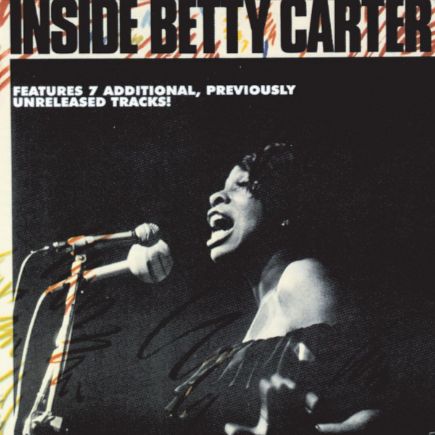Betty Carter, la voix libre du jazz vocal
Figure incontournable du jazz vocal moderne, Betty Carter a redéfini l’art de l’interprétation par son approche radicalement personnelle du chant et de l’improvisation. Née Lillie Mae Jones à Détroit, elle se forme dès l’adolescence dans les clubs de la ville, au contact direct des musiciens de bebop. À seulement seize ans, elle chante avec Charlie Parker, puis côtoie Dizzy Gillespie et Miles Davis. Suivant la voie ouverte par Dinah Washington, elle rejoint en 1948 l’orchestre de Lionel Hampton, où elle fait rapidement sensation par son sens de l’improvisation quasi instrumentale.
D’abord connue sous le nom de scène Lorraine Carter, elle adopte sur les conseils de Hampton celui de Betty Carter, inspiré du surnom artistique Betty Boop qu’on lui donnait dans le milieu. Si son talent suscite l’admiration, son goût prononcé pour l’expérimentation entre vite en conflit avec la vision plus conventionnelle de Hampton. Elle quitte alors son orchestre pour mener une carrière en solo, entamant dès les années 1950 un parcours aussi exigeant qu’indépendant.
Tout au long de sa carrière, elle collabore avec de grandes figures du jazz – notamment Miles Davis, Ray Charles (avec qui elle enregistre l’album Ray Charles and Betty Carter en 1961), Sonny Rollins ou encore Gigi Gryce. Mais c’est en solo, dans des formats réduits, qu’elle façonne un langage vocal d’une rare singularité. Elle y déconstruit les standards du répertoire, préférant les tempos lents, les formes libres et une rythmique audacieuse, dans un style à la fois introspectif et novateur.
En 1963, elle part en tournée au Japon avec Sonny Rollins, puis enregistre pour plusieurs labels. Face au manque de reconnaissance de l’industrie discographique, elle fonde dans les années 1970 sa propre maison de disques et forme son propre trio, reprenant pleinement la maîtrise de son art. Elle traverse les décennies avec une constance artistique remarquable, obtenant un Grammy Award en 1988 et se produisant en 1994 à la Maison-Blanche, en figure de proue du 50e anniversaire du label Verve au Carnegie Hall.
Ce qui distingue Betty Carter, c’est sa capacité à faire du chant un acte d’improvisation pure. À l’instar d’un saxophoniste ou d’un pianiste, elle réinvente chaque morceau en temps réel, jouant avec les rythmes, les silences, les décalages, pour explorer les zones émotionnelles les plus profondes de chaque mélodie. Sa voix – tour à tour chaude, acérée, rugueuse ou caressante – évolue avec fluidité sur l’ensemble du spectre, toujours au service de l’intensité expressive.
Avec plus de cinquante ans de carrière, Betty Carter reste une figure pionnière du jazz vocal, reconnue pour son phrasé unique, sa liberté rythmique et sa vision avant-gardiste de l’interprétation. Elle a laissé une empreinte indélébile sur l’histoire du jazz, ouvrant une voie que peu ont osé suivre, mais qui continue d’inspirer les chanteurs et chanteuses d’aujourd’hui.
Betty Carter, la voz libre del jazz vocal
Figura fundamental del jazz vocal moderno, Betty Carter redefinió el arte de la interpretación con un enfoque radicalmente personal del canto y la improvisación. Nacida como Lillie Mae Jones en Detroit, se formó desde la adolescencia en los clubes locales, en contacto directo con los músicos del bebop. A los dieciséis años ya cantaba con Charlie Parker y poco después colaboraba con Dizzy Gillespie y Miles Davis. Siguiendo los pasos de Dinah Washington, se unió en 1948 a la orquesta de Lionel Hampton, donde rápidamente llamó la atención por su sentido de la improvisación casi instrumental.
Conocida inicialmente como Lorraine Carter, adoptó el nombre artístico de Betty Carter por sugerencia de Hampton, inspirado en el apodo « Betty Boop » que le habían dado en el ambiente musical. Aunque su talento despertaba admiración, su inclinación por la experimentación provocó fricciones con la visión más tradicional de Hampton. Dejó entonces la orquesta para emprender una carrera en solitario, desde los años 50, marcada por una independencia y una exigencia poco comunes.
A lo largo de su carrera colaboró con grandes figuras del jazz, como Miles Davis, Ray Charles (con quien grabó el álbum Ray Charles and Betty Carter en 1961), Sonny Rollins o Gigi Gryce. Pero fue en solitario y en formaciones reducidas donde desarrolló un lenguaje vocal de singularidad extrema. Descomponía los estándares del repertorio, favoreciendo tempos lentos, estructuras libres y una rítmica osada, en un estilo introspectivo y a la vez revolucionario.
En 1963 realizó una gira por Japón con Sonny Rollins, y grabó para varios sellos. Ante la falta de reconocimiento de la industria discográfica, fundó en los años 70 su propio sello y formó su propio trío, recuperando el control total de su arte. Sostuvo una coherencia artística ejemplar a lo largo de las décadas, recibiendo un Grammy en 1988 y actuando en la Casa Blanca en 1994, como figura central del 50º aniversario del sello Verve en el Carnegie Hall.
Lo que distingue a Betty Carter es su capacidad para convertir el canto en un acto de improvisación pura. Como un saxofonista o un pianista, reinventaba cada tema en tiempo real, jugando con los ritmos, los silencios y los desplazamientos, explorando las emociones más profundas de cada melodía. Su voz, que podía ser cálida, cortante, ruda o suave, se deslizaba con fluidez por todo el espectro, siempre al servicio de la expresividad.
Con más de cincuenta años de carrera, Betty Carter sigue siendo una figura pionera del jazz vocal, reconocida por su fraseo único, su libertad rítmica y su visión vanguardista de la interpretación. Dejó una huella imborrable en la historia del jazz, abriendo un camino que pocos se han atrevido a seguir, pero que sigue inspirando a cantantes de todo el mundo.
Betty Carter, la voce libera del jazz vocale
Figura imprescindibile del jazz vocale moderno, Betty Carter ha ridefinito l’arte dell’interpretazione attraverso un approccio profondamente personale al canto e all’improvvisazione. Nata come Lillie Mae Jones a Detroit, si è formata fin da adolescente nei club locali, a stretto contatto con i musicisti bebop. A soli sedici anni canta con Charlie Parker, poi con Dizzy Gillespie e Miles Davis. Seguendo la scia di Dinah Washington, nel 1948 entra nell’orchestra di Lionel Hampton, dove si fa subito notare per la sua capacità di improvvisare con libertà quasi strumentale.
In un primo momento nota con il nome d’arte Lorraine Carter, adotta su consiglio di Hampton il nome di Betty Carter, ispirato al soprannome « Betty Boop » che le veniva attribuito nell’ambiente musicale. Se il suo talento suscita ammirazione, il suo gusto per la sperimentazione entra presto in contrasto con lo stile più convenzionale di Hampton. Decide così di lasciare l’orchestra e avviare una carriera solista, già dagli anni Cinquanta, all’insegna dell’indipendenza e della coerenza artistica.
Nel corso della sua carriera collabora con grandi nomi del jazz, come Miles Davis, Ray Charles (con cui incide l’album Ray Charles and Betty Carter nel 1961), Sonny Rollins o Gigi Gryce. Ma è nel lavoro in piccoli ensemble che sviluppa un linguaggio vocale del tutto originale. Smonta gli standard del repertorio preferendo tempi lenti, forme libere e ritmi arditi, in uno stile introspettivo e innovativo.
Nel 1963 parte per un tour in Giappone con Sonny Rollins, e incide per diverse etichette. Di fronte alla scarsa considerazione dell’industria discografica, negli anni Settanta fonda la propria casa discografica e il proprio trio, riconquistando pienamente la libertà espressiva. Attraversa i decenni con una coerenza esemplare, ottenendo un Grammy Award nel 1988 e partecipando nel 1994 alla cerimonia per il 50° anniversario della Verve alla Casa Bianca e al Carnegie Hall.
Ciò che distingue Betty Carter è la sua capacità di trasformare il canto in un atto di pura improvvisazione. Come un sassofonista o un pianista, reinventa ogni brano in tempo reale, giocando con i ritmi, i silenzi e gli spostamenti per esplorare le profondità emotive di ogni melodia. La sua voce, ora calda, ora tagliente, ruvida o carezzevole, scivola con naturalezza tra i registri, sempre al servizio dell’espressione.
Con oltre cinquant’anni di carriera, Betty Carter rimane una figura pionieristica del jazz vocale, riconosciuta per il suo fraseggio inconfondibile, la libertà ritmica e una visione interpretativa all’avanguardia. Ha lasciato un’impronta indelebile nella storia del jazz, aprendo un percorso che pochi hanno osato intraprendere, ma che continua a ispirare le voci del presente.
Betty Carter, the free voice of vocal jazz
A central figure in modern vocal jazz, Betty Carter redefined the art of interpretation through a deeply personal approach to singing and improvisation. Born Lillie Mae Jones in Detroit, she began performing in local clubs as a teenager, immersed in the world of bebop musicians. By the age of sixteen, she was already singing with Charlie Parker, and later performed with Dizzy Gillespie and Miles Davis. Following in the footsteps of Dinah Washington, she joined Lionel Hampton’s orchestra in 1948, where she quickly made a name for herself with her near-instrumental improvisational style.
Originally known as Lorraine Carter, she adopted the stage name Betty Carter at Hampton’s suggestion, inspired by the nickname « Betty Boop » given to her in artistic circles. Though admired for her talent, her appetite for experimentation clashed with Hampton’s more traditional style. She soon left the orchestra to pursue an independent solo career, beginning in the 1950s.
Throughout her journey, she collaborated with major jazz artists such as Miles Davis, Ray Charles (with whom she recorded the 1961 album Ray Charles and Betty Carter), Sonny Rollins, and Gigi Gryce. But it was in intimate, small-ensemble settings that she forged her uniquely personal vocal language. She deconstructed jazz standards with slow tempos, open forms, and bold rhythmic phrasing, creating a sound that was both introspective and forward-looking.
In 1963, she toured Japan with Sonny Rollins and recorded for several labels. Frustrated by the lack of recognition from the music industry, she founded her own record label and trio in the 1970s, reclaiming full control of her artistry. She maintained artistic consistency over the decades, earning a Grammy Award in 1988 and performing at the White House in 1994 as a leading voice for Verve’s 50th anniversary at Carnegie Hall.
What set Betty Carter apart was her ability to turn singing into pure improvisation. Like a saxophonist or pianist, she reinvented each piece in real time, playing with rhythm, silence, and displacement to explore the emotional depth of every melody. Her voice—by turns warm, sharp, rough, or tender—moved effortlessly across registers, always in service of expressive intensity.
With a career spanning more than fifty years, Betty Carter remains a pioneering figure in vocal jazz, celebrated for her distinctive phrasing, rhythmic freedom, and visionary interpretive style. She left an indelible mark on jazz history, charting a path few dared to follow but which continues to inspire vocalists today.


